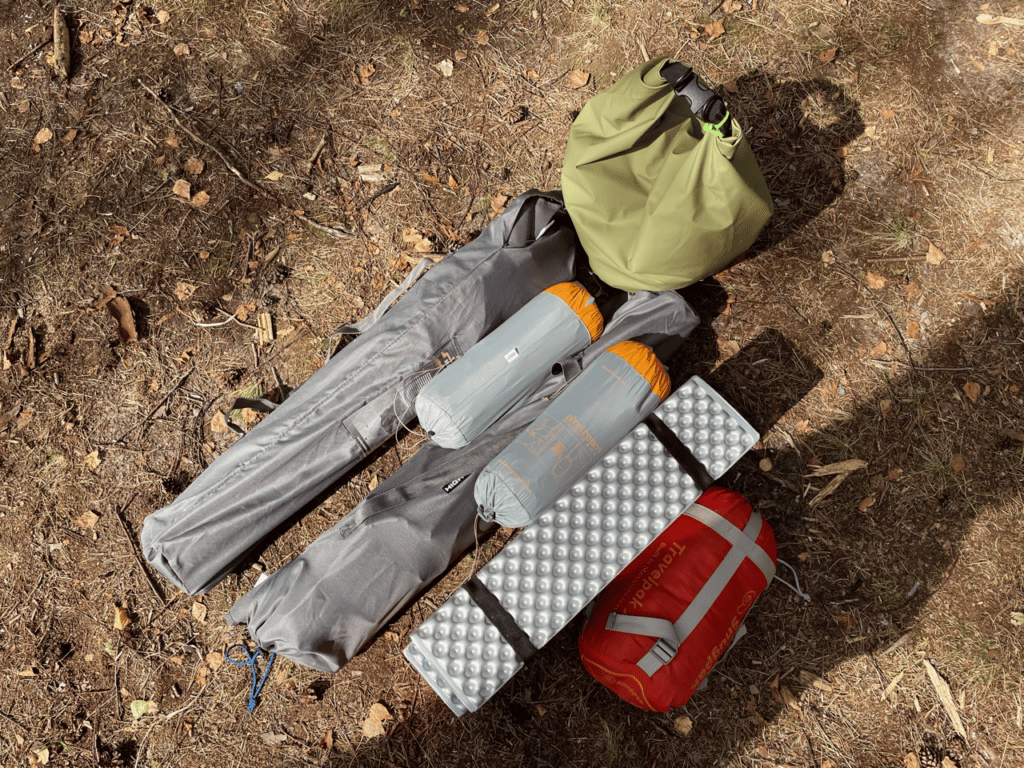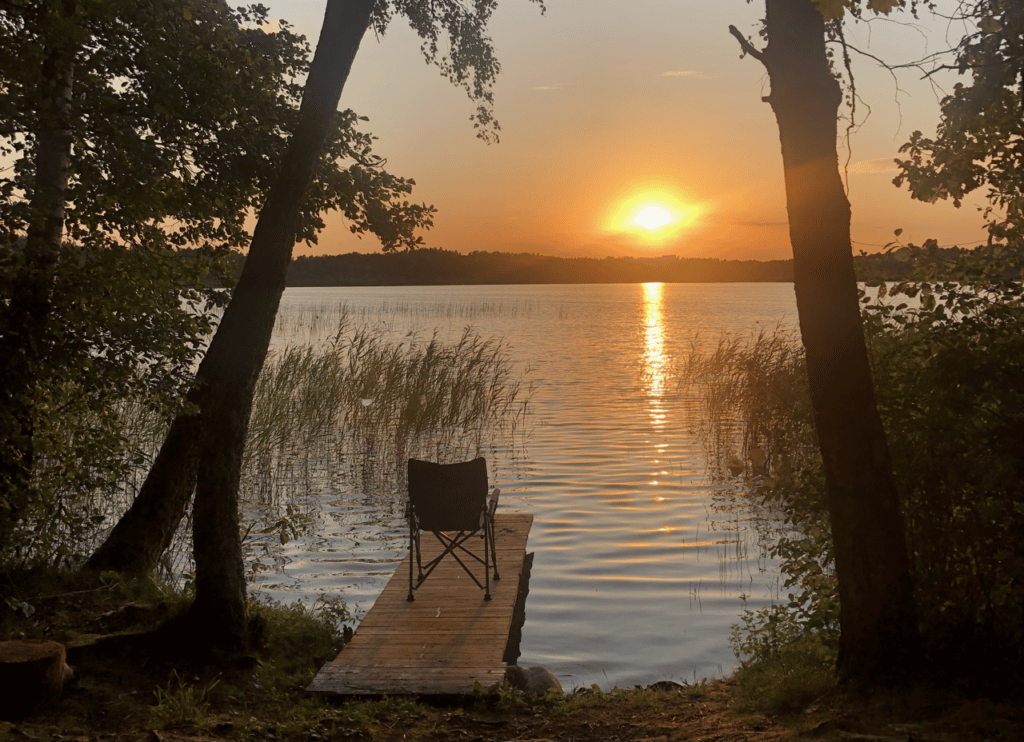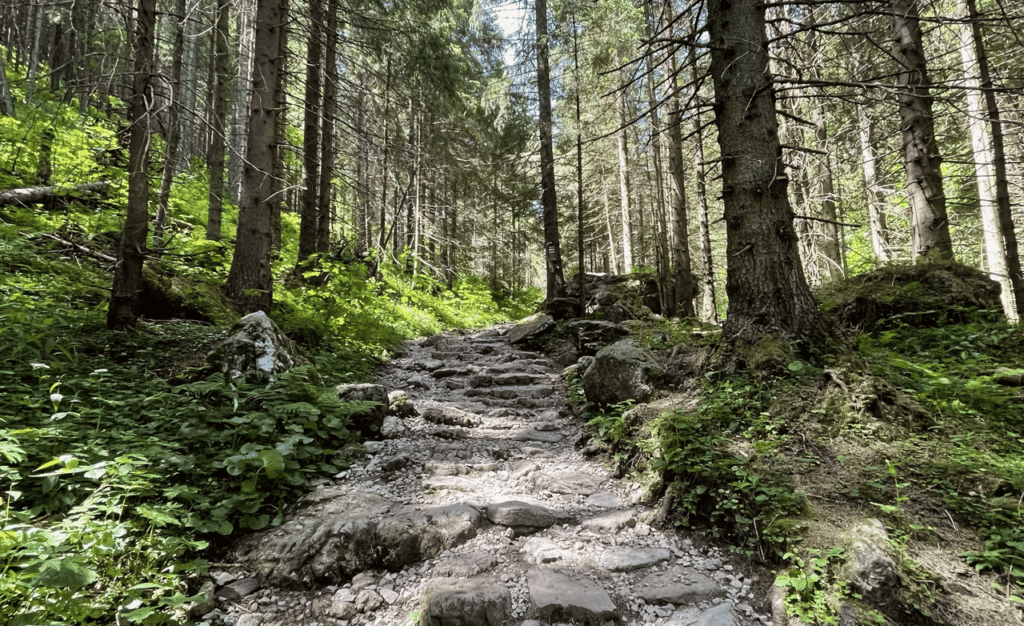There’s something special about spending a night under the stars. But would you resist jumping into a comfy bed all fresh, warm, and relaxed after your hot bath and tasty restaurant dinner? If you’re planning your getaway and the question of camping vs hotel is confusing, don’t worry. We have your back!
Camping vs staying in a hotel
Both camping and hotel rooms come with their pros and cons. Of course, it all comes down to the factors you’re looking for in your trip. We’ve collected some most common ones. Let’s dive down into each!
Cost: is camping cheaper?
Very often, the key argument when we compare camping vs hotel is price. Yes, the initial investment for camping can be expensive if you don’t have the equipment yet. A tent, sleeping bag, air mattress, camping stove, and a cooler can quickly add up, making tent camping costs similar to a couple of nights in a hotel.
But once you buy the camping gear, it’s yours. So, your next camping trip will be a lot cheaper. Of course, if you’re not sure if camping is the thing you’ll do in the future, it’d be wise to consider borrowing the needed gear instead of buying it. A message to your relatives or friends chat can help: are there any camping lovers willing to share a small tent out there?

Other camping fees vary depending on where and how you go. There are lots of camping options – from backpacking to RV camping. If you wish to get as much comfort as possible, you’ll most likely choose a designated campground that applies a fee (again, it depends on a campground) and head there with your car (or RV – renting it might cost a fortune, though).
If you want to save money and explore the wilderness at its best, then dispersed camping – camping outside labeled camp areas – is the best way to go.
When it comes to hotel price – it all depends on the luxury and location of the hotel. Obviously, a budget 3-star hotel a few kilometers away from the city will cost far less than a super expensive top-notch hotel in the heart of the city.
Don’t forget peak seasons, when most hotels in popular tourist destinations inflate the prices.
Hygiene: what about a shower?
Camping has a few drawbacks with trying to keep your hygiene up, that’s for sure. While you can access water amenities at some campsites, dispersed camping makes it more complicated. Unless we consider a river or a lake as an option, which is an easy one.
Though by preparing beforehand, hygiene can be far less of a problem. Wet wipes, hand sanitizers, and cans full of water are here to save the day. You can also buy a camping shower or even a portable toilet for even more home-like experience!
Staying in a hotel, of course, isn’t at all problematic when we talk about hygiene. Constant access to running water and toilets that are cleaned daily by housekeepers – what else would we need?
Technology: how to power up my phone?
A camping trip means disconnecting from the world for some people. No electricity also means no phone, TV, or internet. If you feel like this is something you can’t go without for even a day, camping may not be for you.
But camping is exactly what you need if you see it as an opportunity to reset and recharge away from the hustle and bustle of your everyday life (which is precious for your mental and physical health). And nowadays’ power banks can take care of charging your phone for a couple of days, though.
On the other hand, staying in a hotel always has an electrical outlet close by to power up your devices.
Room size: king room or a tent?
This is one of the key camping vs hotel arguments. When camping, the space you have is limited to the size of your tent. And while you can get something as large as a 12-person tent to stand up in and have a few camping chairs inside, others are smaller and more “claustrophobic”.
Hotels, though, come in all shapes and sizes – from small single rooms to massive suites that could fit an entire family. Of course, for an additional price. Still – if you’re traveling with kids or just need a lot of space to spread out, a hotel room is probably easier than camping.
Privacy: any peace and quiet?
When camping, you’re often close to your neighbors. Unless you’re camping alone. If you’re camping in a crowded campground, it can feel like you’re on top of each other. This lack of privacy can be a deal-breaker for some people.
But camping in a remote location is a perfect way to go if you’re looking for more privacy. In dispersed camping, nature will most likely be your only neighbor.

Of course, hotels also have their problems when it comes to privacy. From thin walls to noisy neighbors, getting some peace and quiet in a hotel room can be challenging. So, if you’re looking for complete privacy on your trip, remote camping might be the solution.
Pets: can I take my fluffy friend together?
This is one of the camping vs hotel arguments with a clear winner – camping. If you’re traveling with a pet, camping is often the only option. While some hotels allow pets, most have strict rules and regulations about them.
Camping, on the other hand, is a great way to include your furry friend in your trip. Most campgrounds allow pets, and some specifically for people traveling with pets.
So, camping is probably your best bet if you’re looking for a pet-friendly vacation option.
Activities: indoors or outdoors?
Comparing camping vs hotel, there’s no clear winner when it comes to activities. It all comes down to your personal preferences and interests.
Camping is probably the better option if you’re looking for outdoor adventures. From hiking and trekking to kayaking and fishing, there are endless exciting activities for camping.

But a hotel might be the way to go if you’re looking for more urban adventures. Hotels are often located close to cities and towns, so there’s always something to do nearby. Not to mention their in-door amenities like spa, fitness centers, pools.
Location: urban vs nature
This is one of the essential camping vs hotel arguments. Camping trips are often located in remote areas, which can be a great way to escape the hustle and bustle of everyday life. Camping is probably your best bet if you’re looking for a relaxing trip in nature.
On the other hand, hotels can be located anywhere – from busy cities to quiet towns. A hotel might be a better option if you’re looking for a specific location for your trip.
Of course, you can find camping locations that are also close to cities and towns. So, camping might be the perfect solution if you’re looking for the best of both worlds.
So, which one to choose?
In the end, the camping vs hotel debate comes down to the experience you’re seeking. Camping is probably your best bet if you’re looking for a rustic trip outdoors. There’s something about being in nature and spending quality time in the fresh air that just can’t be beaten.
But a hotel might be a better option if you’re looking for more of an urban vacation with access to activities and comfy amenities.
It all comes down to what kind of trip you’re looking for. So, before deciding which is better, make sure you know what kind of experience you want on your vacation.
But why not do both?
Why not do both if you can’t decide between camping and staying in a hotel? You could camp for a few nights and then stay in a hotel for the rest of your trip. This way, you get the best of both worlds.
Or, if you’re looking for something in between – glamping, or luxurious camping, might be worth a shot. Check our blog post on camping vs glamping to see if that can be your next plan.